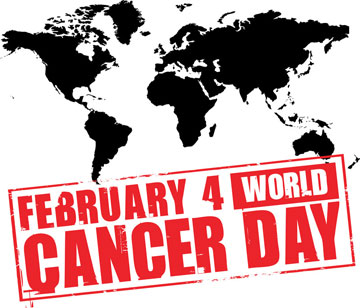 Cancer is a critical health issue affecting millions worldwide. World Cancer Day is observed on February 4 every year to raise awareness about cancer and to encourage people to work to make it a global health priority. This year, the Union for International Cancer Control (UICC), which organizes World Cancer Day, is launching a new 3-year campaign with the theme: “I Am and I Will.” The message is: “Whoever you are, you have the power to reduce the impact of cancer for yourself, the people you love and for the world. It’s time to make a personal commitment.”
Cancer is a critical health issue affecting millions worldwide. World Cancer Day is observed on February 4 every year to raise awareness about cancer and to encourage people to work to make it a global health priority. This year, the Union for International Cancer Control (UICC), which organizes World Cancer Day, is launching a new 3-year campaign with the theme: “I Am and I Will.” The message is: “Whoever you are, you have the power to reduce the impact of cancer for yourself, the people you love and for the world. It’s time to make a personal commitment.”
Cancer is a heterogeneous group of diseases that results from abnormal cell growth. The growth often invades surrounding tissue and spreads to other parts of the body. This dangerous disease is the second-leading cause of death in the world. The American Cancer Society (ACS) estimated that 9.5 million people worldwide would die from cancer in 2018 – about 26,000 cancer deaths a day – and that number is expected to grow.
World Cancer Day aims to save millions of preventable deaths each year by raising awareness and education about cancer, and calling upon governments and individuals across the world to take action against the disease. Specially, this multi-year campaign offers a chance to create long-lasting impact by increasing public-facing exposure and engagement, and providing more opportunities to build global awareness and impact-driven action.
When it comes to prevention or identifying the risk factors, physicians have identified several things which include the most-studied known or suspected risk factors for cancer. While some of these risk factors can be avoided, others such as growing older cannot. So, to lower your risk of developing certain cancers try to limit your exposure to avoidable risk factors. Consider these cancer-prevention tips:
- Quit smoking and using tobacco: Smoking and tobacco use are responsible for 85 percent of all lung cancers and 30 percent of all smoking-related deaths. So quit. Smokers are more at risk than nonsmokers of developing lung, larynx, esophagus, mouth, throat, stomach, kidney, bladder, pancreatic, and cervical cancer. Quitting can reduce your risk of cancer in the future.
- Limit alcohol consumption: If you choose to drink alcohol, make sure you drink in moderation, that is, limit yourself to one drink a day if you’re a woman of any age or a man older than age 65, or two drinks a day if you’re a man 65 years old or younger. If you have more than two drinks a day for years, it will increase your chances of developing various types of cancer.
- Avoid excessive sun exposure: Though getting sunlight is important for health, overexposure can be harmful. The ultraviolet (UV) rays from the sun can increase your risk of skin cancer, which is the most common form of cancer in the United States. To minimize your risks, avoid direct exposure to sunlight between 10 am and 3 pm, stay in the shade, wear protective clothing, use sunscreen 30 minutes before stepping out, and undergo regular skin exams.
- Maintain a healthy diet: Choose a diet that includes lots of fruits, vegetables, whole grains and lean proteins. Avoid red meat, fried food and so on, as these foods have been tied to increased cancer risk. Similarly, avoid contaminated food as it also a small causative factor of cancer.
- Exercise: Being overweight or obese is a major risk factor for cancer. So, work to achieve and maintain a healthy weight through a combination of a healthy diet and regular exercise. Aim for at least 30 minutes of exercise every day.
- Schedule cancer screening exams: Educate yourself about cancer screenings. Talk to your doctor about what types of cancer screening exams are best for you based on your risk factors.
- Get vaccinated: Certain viruses increase risk of cancer. Immunizations may help prevent those viruses, including hepatitis B, which increases the risk of liver cancer, and human papillomavirus (HPV), which increases the risk of cervical cancer and other cancers. Ask your doctor whether immunization against these viruses is appropriate for you ( www.mayoclinic.org).
If detected early, many cancers can be treated and cured with the help of surgery, radiotherapy or chemotherapy. As Mayo Clinic notes, developments in cancer screening and cancer treatment are improving the survival rates for many types of cancer.
This World Cancer Day, take a pledge to join the fight against cancer. This the only day in the global health calendar where people across the world can unite and rally under the one banner in the fight against cancer in a positive and inspiring way. Raising public and political literacy and understanding around cancer can reduce fear, increase understanding, dispel myths and misconceptions, and change behaviors and attitudes (www.worldcancerday.org).